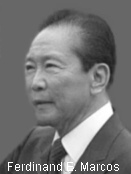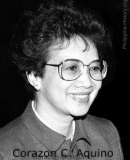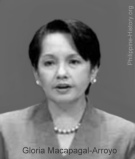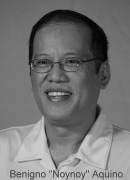 |
| Add caption |
Philippine History During the Martial Law Regime
Ferdinand E. Marcos won the presidency in 1965 and was the first president to be re-elected for a second term in office. Marcos He embarked on an ambitious public works program and maintained his popularity through his first term. His popularity started to decline after his re-election due to perceived dishonesty in the 1969 campaign, the decline in economic growth, government corruption and the worsening peace & order. He declared Martial Law in 1972 near the end of his second & final term in office. Staunch oppositionist, Senator Benigno "Ninoy" Aquino (later went on self exile to the U.S.) & Senator Jose Diokno were one of the first to be arrested. During the Martial Law years, Marcos held an iron grip on the nation with the support of the military. Opposition leaders we imprisoned and the legislature was abolished. Marcos ruled by presidential decrees.
Post Martial Law up to the Present Time
 The 21-year dictatorial rule of Marcos with wife Imelda ended in 1986 following a popular uprising that forced them to exile to Hawaii. Corazon "Cory" Aquino, the wife of exiled and murdered opposition leader Benigno Aquino who was perceived to have won a just concluded snap election was installed as president. Aquino restored civil liberties, initiated the formation of a new constitution and the restoration of Congress.
The 21-year dictatorial rule of Marcos with wife Imelda ended in 1986 following a popular uprising that forced them to exile to Hawaii. Corazon "Cory" Aquino, the wife of exiled and murdered opposition leader Benigno Aquino who was perceived to have won a just concluded snap election was installed as president. Aquino restored civil liberties, initiated the formation of a new constitution and the restoration of Congress.On September 16, 1991, despite the lobbying of Aquino, the Senate rejected a new treaty that would allow a 10-year extension of the US military bases in the country.
In the1992 elections, Pres. Aquino endorsed Secretary of Defense Fidel Ramos as her successor, which Ramos won with a slight margin over his rival, Miriam Defensor-Santiago. During the Ramos presidency, he advocated "National Reconciliation" and laid the ground work for the resolution of the secessionist Muslim rebels in the southern Philippine Island of Mindanao. The Moro National Liberation Front (MNLF) led by Nur Misuari, signed a peace agreement with the government. However a splinter group, The Moro Islamic Liberation Front (MILF) led by Hashim Salamat continued to fight for an Islamic state. Ramos worked for the economic stability of the country and the improvement of the infrastructure facilities like telecommunications, energy and transportation.
Joseph Ejercito Estrada, a popular actor, succeeded Ramos in 1998 with Gloria Macapagal-Arroyo (daughter of former President Diosdado Macapagal) as his Vice-President. Estrada's lack of economic & management skills plunged the economy deeper as unemployment increased and the budget deficit ballooned. In October 2000, Estrada's close friend Luis "Chavit" Singson accused Estrada of receiving millions of pesos from "Jueteng", an illegal numbers game. Soon after, Congress impeached Estrada on grounds of bribery, graft and corruption, betrayal of public trust and culpable violation of the constitution. His impeachment trial at the Senate was however blocked by his political allies in the Senate. Shortly after the evidence against Estrada was blocked at the Senate, thousands of people rallied up at the EDSA Shrine, site of the People Power Revolution which ousted Marcos in 1986.
In January 2001, the Supreme Court declared Joseph Estrada unable to rule in view of mass resignations from his government and declared Vice-President Gloria Macapagal-Arroyo as his constitutional successor. To this date, Estrada remains detained facing graft charges before the Sandigan Bayan, the Anti-graft court.
 Gloria Macapagal-Arroyo, completed the remaining term of Estrada and run for re-election against Fernando Poe, Jr., another popular actor and a friend of Estrada in May 2004. Arroyo with her running mate Noli de Castro was eventually proclaimed the winners of the Presidential & Vice-Presidential elections. She has been advocating a change from a Presidential form of government to a Parliamentary form of government.
Gloria Macapagal-Arroyo, completed the remaining term of Estrada and run for re-election against Fernando Poe, Jr., another popular actor and a friend of Estrada in May 2004. Arroyo with her running mate Noli de Castro was eventually proclaimed the winners of the Presidential & Vice-Presidential elections. She has been advocating a change from a Presidential form of government to a Parliamentary form of government.Arroyo's husband & son has been rumored to be receiving money from gambling lords and this has tainted her reputation. A tape recording of Arroyo talking with a commissioner on elections surfaced establishing impropriety by Arroyo and suggesting that she might have influenced the outcome of the last elections. Demonstrations followed in June 2005 calling for Arroyo to resign.
On the eve of the anniversary of the "People Power Revolution" on February 24, 2006, the government took pre-emptive measures to quash alleged plots to unseat Arroyo through massive rallies and a coup. Arroyo declared a "State of Emergency" the next day mobilizing the police and the military averting any destabilization moves.
May 14, 2007 - National Elections for Senators, Congressmen, Governors, Mayors and local officials. Although there are instances of violence and allegations of cheating specially in Mindanao, this elections is considered by many as one of the most peaceful elections conducted in Philippines.
 September 12, 2007 - Former President Joseph Ejercito Estrada is convicted of plunder by the Sandiganbayan, the anti-graft court and is sentenced to 40 years imprisonment. He is the first former president ever convicted of any crime in Philippine history. Six weeks later, on October 26, Estrada was pardoned by President Arroyo.
September 12, 2007 - Former President Joseph Ejercito Estrada is convicted of plunder by the Sandiganbayan, the anti-graft court and is sentenced to 40 years imprisonment. He is the first former president ever convicted of any crime in Philippine history. Six weeks later, on October 26, Estrada was pardoned by President Arroyo.Benigno Simeon Cojuangco Aquino III, affectionately called "Noynoy", the son of former President Corazon C. Aquino and the late Senator Benigno Aquino, won the May 10, 2010 presidential elections. He was proclaimed president on June 30, 2010 at Rizal Park in Manila. Former President Gloria Arroyo, was elected congresswoman for the second district of Pampanga. This was the first computerized national elections in Philippine history.
No comments:
Post a Comment